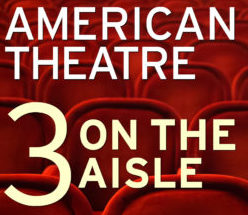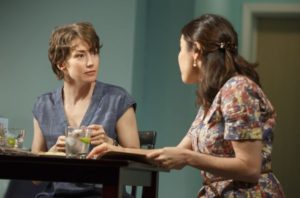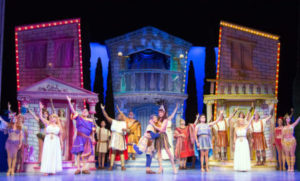 As if I didn’t have more than enough to do, I’ve just started a podcast about theater in America, a collaborative venture with Peter Marks, Elisabeth Vincentelli, and American Theatre called Three on the Aisle.
As if I didn’t have more than enough to do, I’ve just started a podcast about theater in America, a collaborative venture with Peter Marks, Elisabeth Vincentelli, and American Theatre called Three on the Aisle.
To listen to the first episode and find out how to subscribe, go here.
Here’s the official press release for Three on the Aisle, which will tell you exactly what Peter, Elisabeth, and I are up to. We very much hope that you’ll download our first episode and follow us henceforth.
* * *
Today American Theatre releases the first episode of its new podcast, Three on the Aisle. Featuring drama critics Peter Marks, Terry Teachout, and Elisabeth Vincentelli, Three on the Aisle is a podcast from New York about theatre in America.
Three on the Aisle joins Offscript, American Theatre’s podcast on all things theatrical. American Theatre is a publication of Theatre Communications Group, the support and service organization for U.S. nonprofit theatres.
“This is a great, exciting, scary time to look at and think about theatre in America, and what it tells us about the world we live in,” says Vincentelli, a contributor to <.I>The New York Times, The New Yorker, Newsday, and The Village Voice and a regular guest on the TV show Theater Talk. “The three of us have different backgrounds, different tastes, different opinions. Let a thousand spirited discussions bloom!”
 “Elisabeth, Terry and I all love the theatre—you can’t do our job if you don’t—but our tastes don’t always coincide,” says Marks, chief drama critic for the Washington Post, a position he’s held since 2002, after spending a decade at The New York Times and co-authoring the business book Good for the Money. “That’s what made the idea of a regular get-together to talk out our differences, passionately but civilly, so attractive.”
“Elisabeth, Terry and I all love the theatre—you can’t do our job if you don’t—but our tastes don’t always coincide,” says Marks, chief drama critic for the Washington Post, a position he’s held since 2002, after spending a decade at The New York Times and co-authoring the business book Good for the Money. “That’s what made the idea of a regular get-together to talk out our differences, passionately but civilly, so attractive.”
“This isn’t going to be a show about three critics sitting in a room, swapping here’s-what-I-saw-last-week chatter,” adds Teachout, drama critic for The Wall Street Journal, critic-at-large for Commentary, and the author of biographies of Louis Armstrong, George Balanchine, Duke Ellington, and H.L. Mencken. “There’ll be some of that, but we’re even more interested in engaging with the issues that are shaping the American theatre scene right now.”
In the first episode, Peter, Terry, and Elisabeth talk about their theatrical tastes, discuss the state of political theatre in the Age of Trump, and pick the shows they’re most excited about seeing in the first half of the 2017-18 season. Future episodes will feature guest panelists from around the country and will touch on such topics as the problem of earning a living in regional theatre, the fast-growing prominence of female stage directors, the growing dominance of small-cast plays, and the challenges and rewards of solo shows.

 “Merrily We Roll Along,” Stephen Sondheim’s biggest flop, closed on Broadway after just 16 performances. Several valiant attempts to resuscitate the show have since been undertaken, and the revised version that Eric Schaeffer directed in 2007 at Arlington’s Signature Theatre proved that “Merrily” can be made to work. I haven’t reviewed it since then, though, so I went up to Boston to check out the U.S. transfer of Maria Friedman’s London revival, which Mr. Sondheim himself calls “the best I’ve seen.” Far be it from me to disagree: This is certainly the best “Merrily” I’ve seen…
“Merrily We Roll Along,” Stephen Sondheim’s biggest flop, closed on Broadway after just 16 performances. Several valiant attempts to resuscitate the show have since been undertaken, and the revised version that Eric Schaeffer directed in 2007 at Arlington’s Signature Theatre proved that “Merrily” can be made to work. I haven’t reviewed it since then, though, so I went up to Boston to check out the U.S. transfer of Maria Friedman’s London revival, which Mr. Sondheim himself calls “the best I’ve seen.” Far be it from me to disagree: This is certainly the best “Merrily” I’ve seen… “Mary Jane,” Amy Herzog’s masterly play about a single mother with a severely disabled child, has transferred to the New York Theatre Workshop after its Yale Repertory Theatre premiere. Ms. Herzog and Anne Kauffman, the director, have done a bit of work on the script and production since it opened in New Haven, cutting the intermission and restaging the climactic scene, in both cases to good effect. They’ve also recast the show, in which Carrie Coon now plays the title role. Ms. Coon went on to TV stardom after winning a Tony nomination for her performance in the 2012 Broadway revival of “Who’s Afraid of Virginia Woolf?” Nevertheless, she’s still a stage actor of the first rank, and in “Mary Jane” she rises to the tricky challenge of playing a very nice but rather ordinary young woman—ordinary, that is, save for her indomitable courage—in a way that is matchlessly vivid….
“Mary Jane,” Amy Herzog’s masterly play about a single mother with a severely disabled child, has transferred to the New York Theatre Workshop after its Yale Repertory Theatre premiere. Ms. Herzog and Anne Kauffman, the director, have done a bit of work on the script and production since it opened in New Haven, cutting the intermission and restaging the climactic scene, in both cases to good effect. They’ve also recast the show, in which Carrie Coon now plays the title role. Ms. Coon went on to TV stardom after winning a Tony nomination for her performance in the 2012 Broadway revival of “Who’s Afraid of Virginia Woolf?” Nevertheless, she’s still a stage actor of the first rank, and in “Mary Jane” she rises to the tricky challenge of playing a very nice but rather ordinary young woman—ordinary, that is, save for her indomitable courage—in a way that is matchlessly vivid….

 IN PHILADELPHIA:
IN PHILADELPHIA: